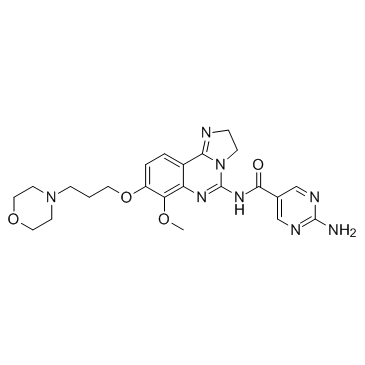1032568-63-0
| Name | 2-amino-N-[7-methoxy-8-(3-morpholinopropoxy)-2,3-dihydroimidazo[1 ,2-c]quinazolin-5-yl]pyrimidine-5-carboxamide |
|---|---|
| Synonyms |
2-Amino-N-{7-methoxy-8-[3-(4-morpholinyl)propoxy]-2,3-dihydroimidazo[1,2-c]quinazolin-5-yl}-5-pyrimidinecarboxamide
Copanlisib 2-Amino-N.N-diaethyl-toluolsulfonamid-(4) 2-amino-toluene-4-sulfonic acid diethylamide 2-Amino-toluol-4-sulfonsaeure-diaethylamid 2-amino-N-[7-methoxy-8-(3-morpholin-4-ylpropoxy)-2,3-dihydroimidazo-[1,2-c]quinazolin-5-yl]pyrimidine-5-carboxamide BAY 80-6946 BAY 80-6946 (Copanlisib) |
| Description | Copanlisib (BAY 80-6946) is a selective and ATP-competitive class-I PI3 kinases inhibitor, with IC50s of 0.5, 0.7, 3.7 and 6.4 nM for PI3Kα, PI3Kδ, PI3Kβ and PI3Kγ, respectively. |
|---|---|
| Related Catalog | |
| Target |
PI3Kα:0.5 nM (IC50) PI3Kβ:3.7 nM (IC50) PI3Kδ:0.7 nM (IC50) PI3Kγ:6.4 nM (IC50) mTOR:45 nM (IC50) |
| In Vitro | Copanlisib (BAY 80-6946) potently inhibits the catalytic activity of the class I PI3Kα, β, γ, and δ isoforms with IC50s of 0.5, 3.7, 6.4, and 0.7 nM, respectively. Copanlisib (BAY 80-6946) shows significantly weaker activity against mTOR with an IC50 of 45 nM. In KPL4 cells, Copanlisib (BAY 80-6946) reduces basal levels of AKT phosphorylation at both Thr308 and Ser473 with IC50 values of 0.4 and 0.6 nM, respectively. Copanlisib has mean IC50 values of 19 nM against cell lines with PIK3CA-activating mutations (n = 9) and 17 nM against HER2-positive cell lines (n=7), whereas the activity in PIK3CA wild-type and HER2-negative cells is about 40-fold less potent (average IC50=774 nM; n=11)[1]. |
| In Vivo | Copanlisib (BAY 80-6946) is highly efficacious in a variety of human tumor xenograft models derived from different tumor indications that exhibit an activated PI3K pathway. Copanlisib (BAY 80-6946) is administered at 0.5 to 6 mg/kg i.v. every second day for a total of five doses starting on day 14, following tumor cell implantation. On day 25, 3 days after the last dose, TGI rates of 77%, 84%, 99%, and 100% are observed with Copanlisib (BAY 80-6946) at doses of 0.5, 1, 3, and 6 mg/kg, respectively. Complete tumor regression is shown in 10 of 10 rats in the 3 and 6 mg/kg groups, and all rats remained tumor free at the termination of the study on day 73. Tumor growth delays more than 25 days are observed in the 0.5 and 1 mg/kg dose groups[1]. |
| Cell Assay | The 5 mM stock solution of Copanlisib (BAY 80-6946) (in DMSO with 10 mM trifluoroacetic acid) is used. The cell lines are maintained in RPMI-1640 medium containing 10% heat-inactivated fetal calf serum. Cell proliferation is determined using the CellTiter-Glo Luminescent Cell Viability Kit[1]. |
| Animal Admin | Mice and Rats[1] The in vivo antitumor efficacy of Copanlisib (BAY 80-6946) is assessed in athymic nude rats or nude mice using xenograft models of human tumors. Animals are housed according to institutional guidelines with access to food (pelleted diet) and water ad libitum. Studies with patient-derived tumors are conducted in EPO GmbH or in Oncotest GmbH with written formed consent from each patient and the approval from local ethical committees. Tumor xenografts are generated by harvesting cells from mid-log phase cultures and injecting subcutaneously into the right flank of each rat and mouse. Treatment is initiated when all animals in an experiment had established tumors. Copanlisib (BAY 80-6946) is administered every second day, every third day, or weekly via an intravenous bolus at the indicated doses. Tumor dimensions and body weights are recorded twice weekly starting on the first day of treatment. Tumor volumes are calculated. Antitumor efficacy is determined as a function of tumor growth inhibition (% TGI). TGI is calculated. |
| References |
| Density | 1.5±0.1 g/cm3 |
|---|---|
| Molecular Formula | C23H28N8O4 |
| Molecular Weight | 480.520 |
| Exact Mass | 480.223358 |
| PSA | 146.23000 |
| LogP | -1.00 |
| Index of Refraction | 1.722 |
| Storage condition | -20℃ |
